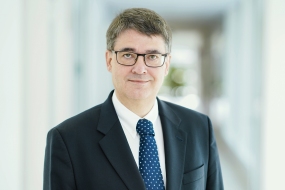Honorary doctorate for Michael Baumann
The Faculty of Medicine at Aarhus University, Denmark, will award an honorary doctorate to Michael Baumann, Chairman of the Board and Scientific Director of the German Cancer Research Center, on September 9.
With the honorary doctorate, Aarhus University recognizes Michael Baumann's achievements in radiation biology and experimental radiotherapy. Baumann has successfully applied new scientific results from radiobiology to develop improved radiotherapy techniques, A particular focus of his research is the development of individualized radiotherapies based on biomarkers that predict the radiosensitivity of a tumor. These include, for example, DNA repair systems or oxygen saturation in tumor tissue. Using such biomarkers, it is increasingly possible to tailor the required intensity of radiation to each patient.
Aarhus University pays special tribute to Michael Baumann's central concern: Research results, is his credo, must benefit patients as quickly as possible: He is therefore consistently committed to ensuring that promising results from basic cancer research are tested in clinical trials. Only in this way can research actually lead to new approaches to cancer prevention, diagnosis and therapy.
With the honorary doctorate, the university also honors Michael Baumann's merits for cancer research in Denmark and in particular at the Aarhus site. As a member of scientific advisory boards in Denmark, he has on many occasions contributed his experience and expertise to the reorientation of translational oncology research.
Michael Baumann received his doctorate in medicine in Hamburg in 1988. He then worked as a postdoctoral fellow at the Massachusetts General Hospital at Harvard Medical School in Boston until the end of 1989. After his training as a specialist in radiation therapy, he completed his habilitation in Hamburg in 1994. In 1995, he moved to the Carl Gustav Carus Medical Faculty in Dresden as head of experimental radiation oncology. From 2003, he was the founding director of the Dresden University Cancer Center. From 2010, he was Director of Radiation Therapy and Radiooncology at the University Hospital Dresden and simultaneously Director of the Institute of Radiooncology at the Helmholtz Center Dresden-Rossendorf. Since November 1, 2016, he has been Chairman of the Board and Scientific Director of DKFZ.
Michael Baumann has published over 500 scientific papers in medical journals. He has received a number of academic awards, including the Michael Fry Award of the American Radiation Research Association, the Breur Gold Medal and the Regaud Gold Medal of the European Radiation Oncologists, and the German Cancer Award in the Translational Research Division.
He was elected a member of the National Academy of Sciences Leopoldina in 2004 and an honorary member of the American College of Radiology (ACR) in 2021. Michael Baumann has served as president of the European Society of Radiation Oncology (ESTRO), the European Cancer Society (ECCO), and the German Society of Radiation Oncology (DEGRO).
The honorary doctorate will be awarded on September 9 during the annual celebration of Aarhus University. In addition to Michael Baumann, four other scientists will receive honorary doctorates on this occasion.
With more than 3,000 employees, the German Cancer Research Center (Deutsches Krebsforschungszentrum, DKFZ) is Germany’s largest biomedical research institute. DKFZ scientists identify cancer risk factors, investigate how cancer progresses and develop new cancer prevention strategies. They are also developing new methods to diagnose tumors more precisely and treat cancer patients more successfully. The DKFZ's Cancer Information Service (KID) provides patients, interested citizens and experts with individual answers to questions relating to cancer.
To transfer promising approaches from cancer research to the clinic and thus improve the prognosis of cancer patients, the DKFZ cooperates with excellent research institutions and university hospitals throughout Germany:
The DKFZ is 90 percent financed by the Federal Ministry of Education and Research and 10 percent by the state of Baden-Württemberg. The DKFZ is a member of the Helmholtz Association of German Research Centers.


